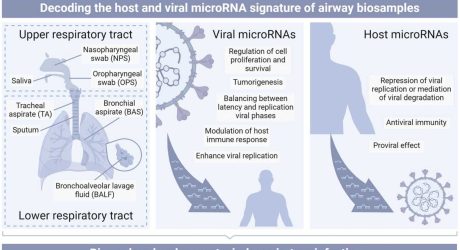Multi-microRNA test improves mortality prediction in critically ill COVID-19 patients
Samples from 19 ICUs in different regions of Spain were analysed
A study has identified a 4-microRNA signature that improves early prediction of mortality in critically ill COVID-19 patients. The results of the research, led by several groups of the CIBER area of Respiratory Diseases (CIBERES), with the participation of research staff from the Institute for Research in Biomedicine of Lleida (IRBLleida), have been published in the journal Respiratory Research.
MicroRNAs are small non-coding RNA molecules that have been proposed in recent years as innovative biomarkers in various pathologies. These molecules can be quantified minimally invasively in any fluid using established techniques in clinical laboratories, such as quantitative PCR. One of the authors of the study and researcher at CIBERES and the Translational Research in Respiratory Medicine group at IRBLleida, Marta Molinero, states that “this work demonstrates the potential of microRNAs as biomarkers for the early prediction of mortality in critically ill patients with COVID-19”.
The research involved the collaboration of 19 ICUs distributed in different regions of Spain, which are part of the CIBERESUCICOVID(*) project, and 503 plasma samples were collected from the patients. After quantifying the profile of circulating microRNAs found in the plasma, the researchers constructed a signature composed of 4 microRNAs that allowed patients to be categorised, within 48 hours of admission to the ICU, according to their risk of mortality.
This multi-microRNAs test developed allows improved prediction of patient mortality compared to conventional severity indices and models based on clinical predictors. This test would therefore have a significant impact on the care and treatment of these patients, allowing early stratification and personalised intervention. Marta Molinero states that “the results of the study support the application of innovative techniques to improve the prediction and treatment of severe diseases such as COVID-19” and adds that its ultimate goal is to “improve the outcomes and survival of the most severe patients”.
Other molecular pathways associated with COVID-19
Using a functional enrichment analysis, the study authors additionally identified nine molecular pathways associated with severe COVID-19 pathology. The study coordinator and principal investigator of CIBERES and IRBLleida and territorial clinical director of Chronic Respiratory Diseases in Lleida, Ferrán Barbé, explains that “the identification of the molecular pathways associated with severe COVID-19 provides us with valuable information on the underlying mechanisms of the disease. This could pave the way for the development of new therapies and treatment approaches to help fight this pathology more effectively.
This research has been funded by the Instituto de Salud Carlos III, CIBERES, the Unión Española de Entidades Aseguradoras y Reaseguradoras (UNESPA) and the Fundació La Marató de TV3.
Specifically, the Fundació La Marató de TV3 is funding the project ‘A systems biology approach to understand COVID-19 pathophysiology and predict outcome (SISTEMA-BIO-COVID)’ led by the researcher, David de Gonzalo, from the Translational Research in Respiratory Medicine research group at IRBLleida. This project was chosen among the 36 projects funded by the Marató 2020 dedicated to COVID-19. The project is carried out in collaboration with the researcher, Jesús Francisco Bermejo Martín, from the Fundación Instituto de Investigación Biomédica de Salamanca (IBSAL).
Article: D. Gonzalo-Calvo, D., Molinero, M., Benítez, I.D. et al. A blood microRNA classifier for the prediction of ICU mortality in COVID-19 patients: a multicenter validation study. Respir Res 24, 159 (2023). https://doi.org/10.1186/s12931-023-02462-x




